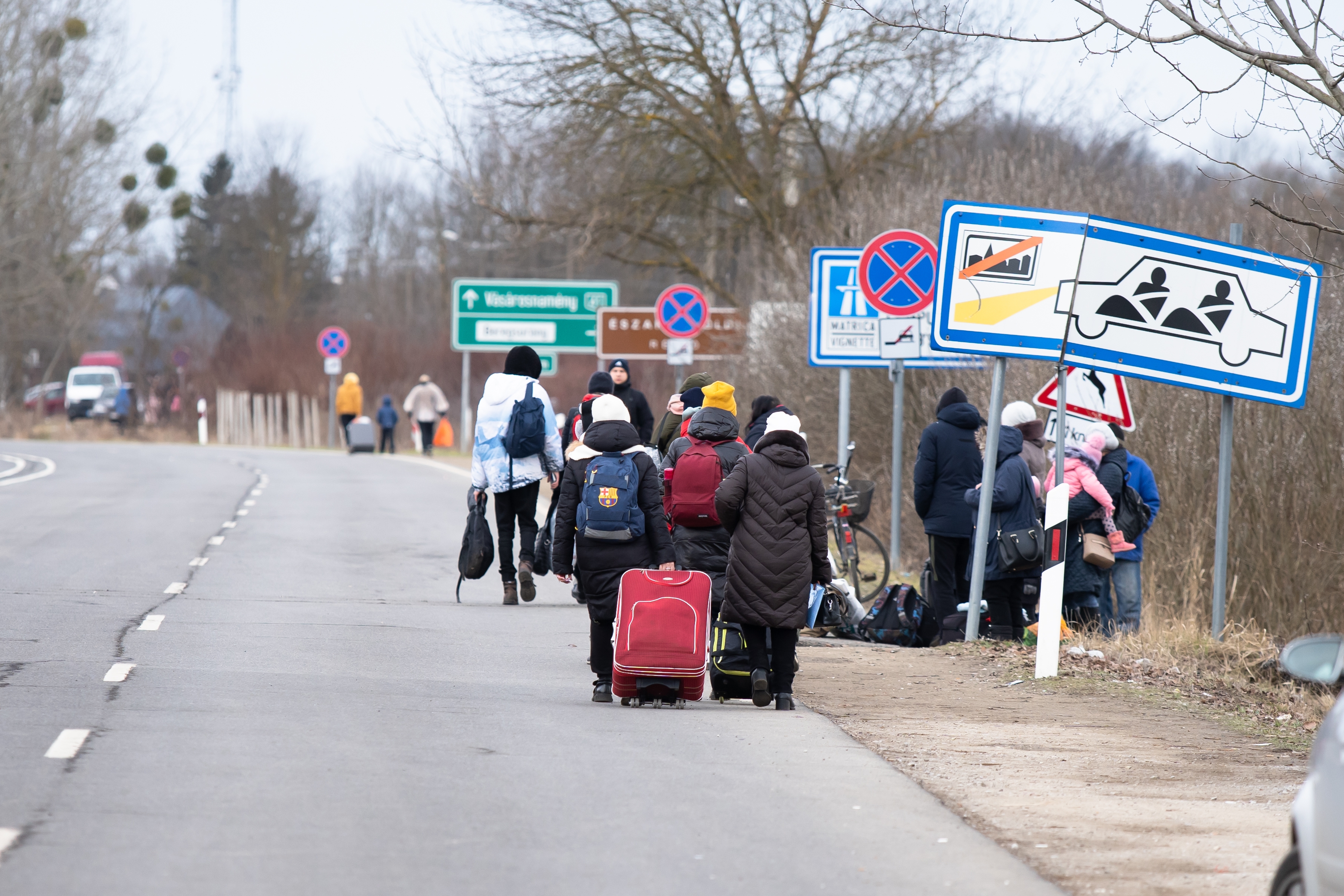Russia sent hundreds of thousands of troops into its war in Ukraine and suffered immense casualties. Some were drawn from prisons, both officially and through a private military company called the Wagner Group. With the support of the Pulitzer Center, Simon Ostrovsky and Yegor Troyanovsky traveled to a Ukrainian prisoner of war camp and met men faced with a stark choice, prison or the frontlines.

As a nonprofit journalism organization, we depend on your support to fund coverage of global conflicts. Help us continue funding the hard costs of in-depth coverage of the Ukraine invasion—including travel, hostile environment safety training, and the increased security expenses that arise from reporting in war zones.
Read the Full Transcript
Amna Nawaz: Russia has thrown hundreds of thousands of troops into its war in Ukraine and suffered immense casualties. Some of those personnel are drawn from Russia's prisons, both officially and through a private military company called the Wagner Group.
With the support of the Pulitzer Center, special correspondent Simon Ostrovsky and videographer Yegor Troyanovsky traveled to a Ukrainian prisoner of war camp. They met with men faced with a stark choice: prison or the front lines.
Simon Ostrovsky: This is Artyom. Three months ago, he was serving a nine-year sentence for murder in a Russian penal colony. Now he's calling his mother to tell her he's no longer a convict. He's a prisoner of war.
Artyom, Prisoner of War (through translator): Hello. Mom. Hi,
Woman (through translator): Hello?
Artyom (through translator): It's me. Listen, everything is OK. Don't worry. I'm OK. Basically, I have been captured in Ukraine, understand?
Woman (through translator): But how?
Artyom (through translator): It's war. That's what happens.
Woman (through translator): Are you being fed?
Artyom (through translator): Everything's OK. There's food.
Woman (through translator): Are they hurting you?
Artyom (through translator): No. The surprising thing is, the people in Ukraine are OK.
Simon Ostrovsky: He's not alone. Artyom, whose name we have changed, is one of tens of thousands of convicts, who have been taken from prisons in Russia since June and thrown into the meat grinder that is the front line of the war in Ukraine.
As he waited in line to use the phone, he told us he had three years of his prison sentence left and was recruited with a promise of freedom and good pay.
Artyom (through translator): These military guys show up in full uniform and say: Here's how it is. You fight for half-a-year. If you're alive and well, you get a full pardon, 100,000 rubles per month. Yes or no?
I say yes. I figure I can fight for half-a-year.
Simon Ostrovsky: Almost immediately, he was transported to an airfield by prison bus and flown to Russian-occupied areas of Ukraine, where he received about a month of training. Then he was ordered to storm a village.
Artyom (through translator): They point to some coordinates and tell the commander: Go there. Take the positions and fight.
That's it. So we go. We get there. They're shooting. Everything is brutal, like war, real brutal.
Simon Ostrovsky: After securing a foothold in the village, the convicts were ordered to retreat and were replaced by a different group of soldiers.
Although we weren't able to independently verify Artyom's account, it corresponds to assessments of how Russia is using convicts as expendable fighters thrown at the enemy in human waves. For many of the convicts being held here, the path from a Russian prison to a Ukrainian prisoner of war camp is very short, because the Russian military uses the convicts as storm troops, and the casualty rate is very high, and so is the rate of capture.
This man was recruited from a prison in the occupied the Donetsk region of Ukraine, and was told he'd merely be used to dig trenches and carry the wounded.
Man (through translator): Then, when we arrived for our rotation, there weren't enough people, and we were forced into a wave. Our APC was hit. And we all jumped into the trenches, and they just threw a bunch of grenades at us. I lost consciousness. I don't remember anything else.
Simon Ostrovsky: When he came to, his leg was gone, and he was a prisoner of war.
But the vast majority of prisoners-turned-fighters have been recruited by this man, Yevgeny Prigozhin, the owner of Russia's foremost military contractor, the Wagner Group
Yevgeny Prigozhin, Wagner Group (through translator): We're very scrupulous about those who are convicted of sexual crimes. But we understand that, sometimes, people make mistakes. Who do we want? We are looking for storm troops only.
Simon Ostrovsky: Last summer, Prigozhin, who's an ex-con himself, started visiting prisons around Russia to offer convicts a chance at freedom if they joined his ranks, and he didn't mince his words.
Yevgeny Prigozhin (through translator): The biggest sin is desertion. No reverse, not one step back. No one gives themselves up. In training, you will be told about the two grenades you have to use when you get captured.
Man (through translator): Yevgeny Prigozhin flew into our prison and talk to the prisoners. There were 560 people; 220 agreed to sign a contract with the Wagner Group and participate in the special military operation.
Simon Ostrovsky: This prisoner had eight years left to serve on a sentence for attempting to sell two kilograms of narcotics, when he signed a contract with the Wagner Group. After training for seven weeks, he fought just one battle.
Man (through translator): On January 2, we were given orders to advance 500 meters to the tree line. There were 10 of us. As we advanced, we were engaged. We had only advanced about 70 meters. Eight of us were killed. The commander who was wounded called back to our lines, and I ended up being captured.
Simon Ostrovsky: Now his greatest fear is being traded to Russia and getting thrown back into battle
Man (through translator): Because I signed a contract, I have still got two months left, according to the contract.
Simon Ostrovsky: "NewsHour" had to agree not to show guards' faces or disclose the location of the POW camp to gain access. The prison is regularly monitored by international observers and appears to be run as a model facility.
The POWs we spoke with told us they were giving interviews of their own free will. And while we can't be certain they weren't under duress, some of their responses were even defiant.
Man (through translator): When they came to see us, they said that they were from a private military contractor. They said they could help us get out of prison early, wash our guilt away with blood, so to speak.
I decided that I was needed not only by my family, but by my country. So, whatever I'm ordered to do, sorry, but, as a soldier, I'm required to carry it out. A Russian person must defend their country.
Olga Romanova is the Director of Russia Behind Bars, a prisoner rights group with extensive sources in the Russian penitentiary system. She told me Wagner alone had recruited as many as 50,000 prisoners to fight in Ukraine as of February of this year.
Olga Romanova, Director, Russia Behind Bars (through translator): Since February 1, the Defense Ministry has started recruiting from the same prisons as Wagner. They offer a full pardon after half-a-year, same as Wagner $140 a day, $50,000 for an injury leaving to a handicap, and $80,000 in case of death.
Simon Ostrovsky: What's the social effect that this is having in Russia, given the fact that the people aren't — that the prisoners aren't serving their full terms? How is that affecting their victims or the families of the victims of the convicts?
Olga Romanova (through translator): They could still recruit 150,000 to 200,000 prisoners, in addition to the 50,000 they have already signed up, easily.
And how has Russian society reacted? No one is sorry. Everyone prefers it to be the prisoners, rather than their own sons and husbands, naturally. So this policy is very popular.
Simon Ostrovsky: For former prisoners, life as a POW isn't as big an adjustment as it is for ordinary soldiers, who are unfamiliar with the strict regime of a secure facility.
Artyom (through translator): This is a prison facility. If you don't break the rules, everything's all right. We just got here yesterday, and I haven't seen anything really bad yet.
Simon Ostrovsky: The biggest question for them is whether they will end up back in prison in Russia, or back on the front lines of Ukraine, or as free men.
For now, the only thing they're certain of is that they have managed to survive this far.
For the "PBS NewsHour," I'm Simon Ostrovsky in Western Ukraine.









